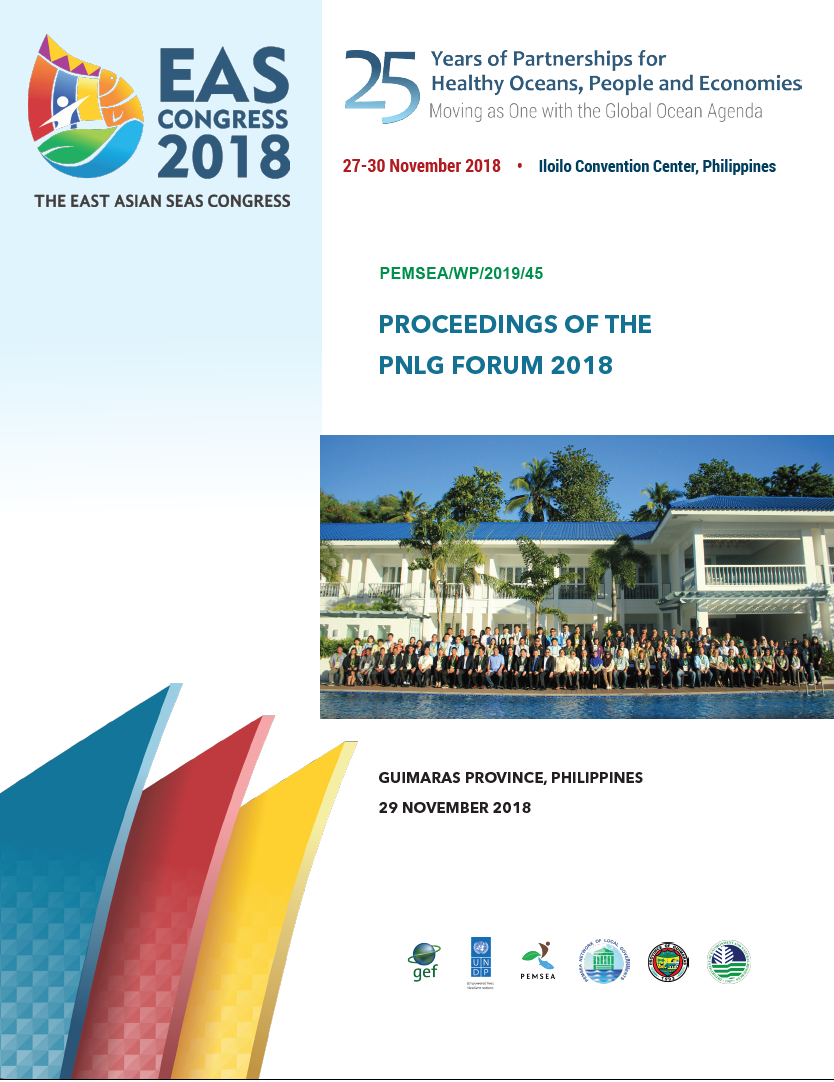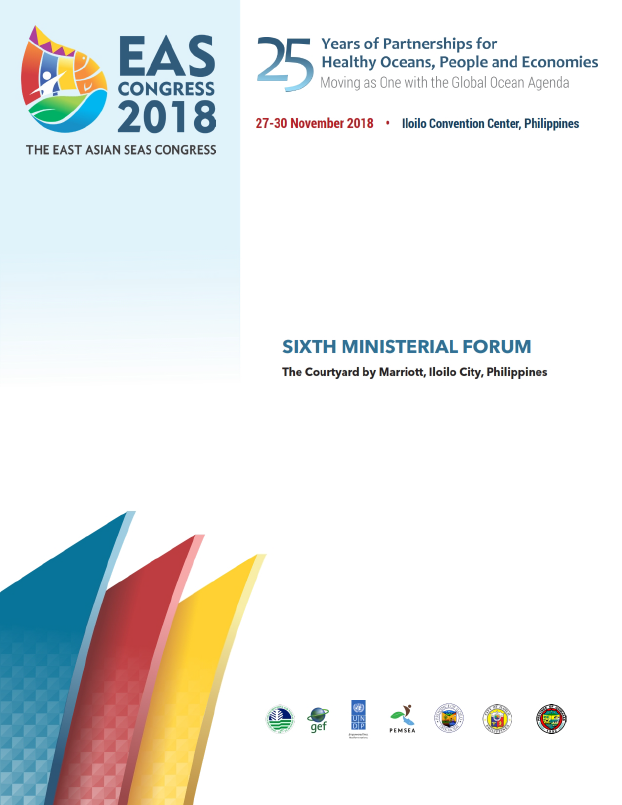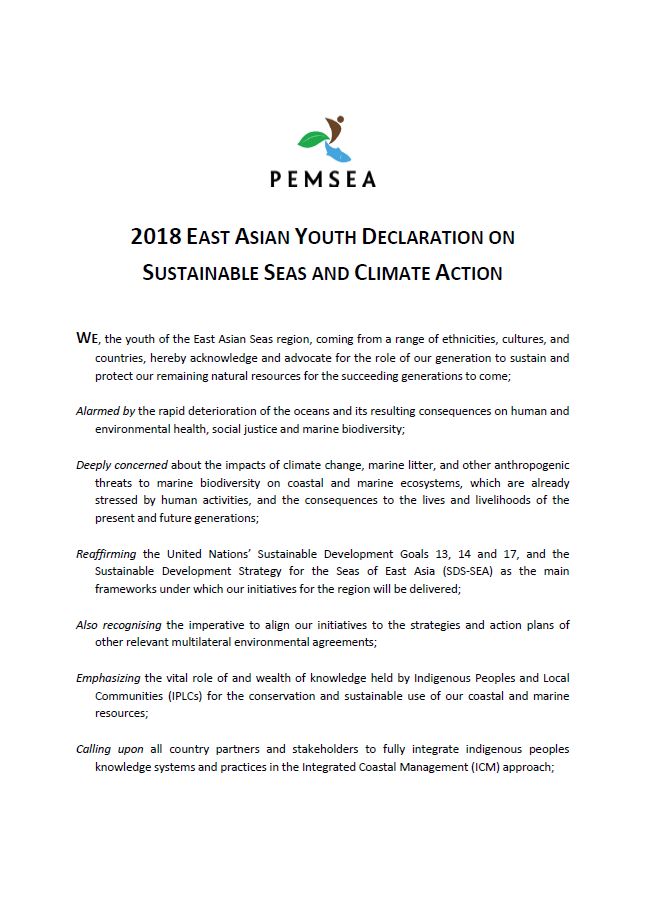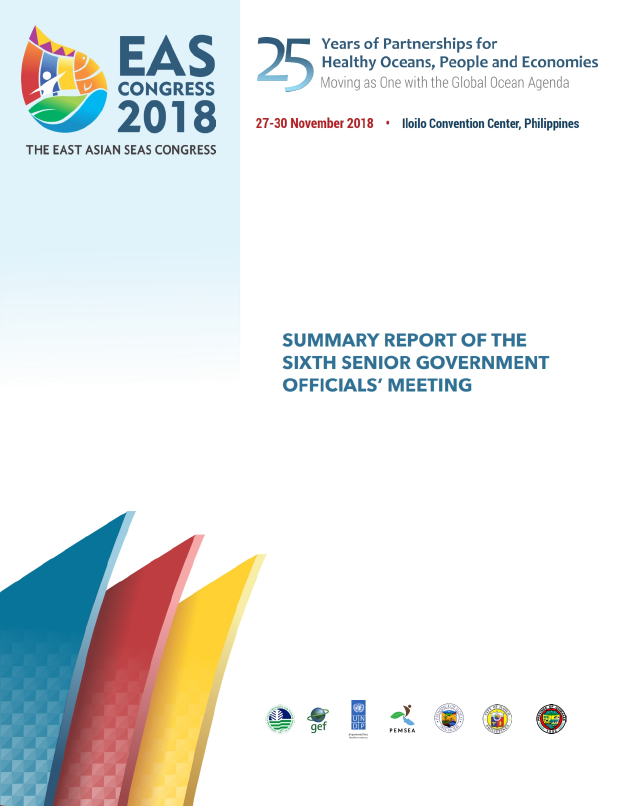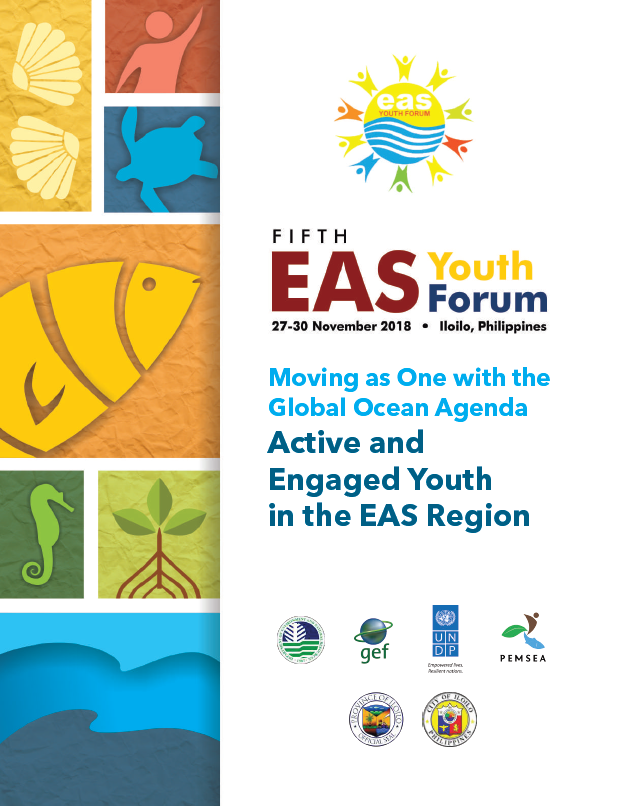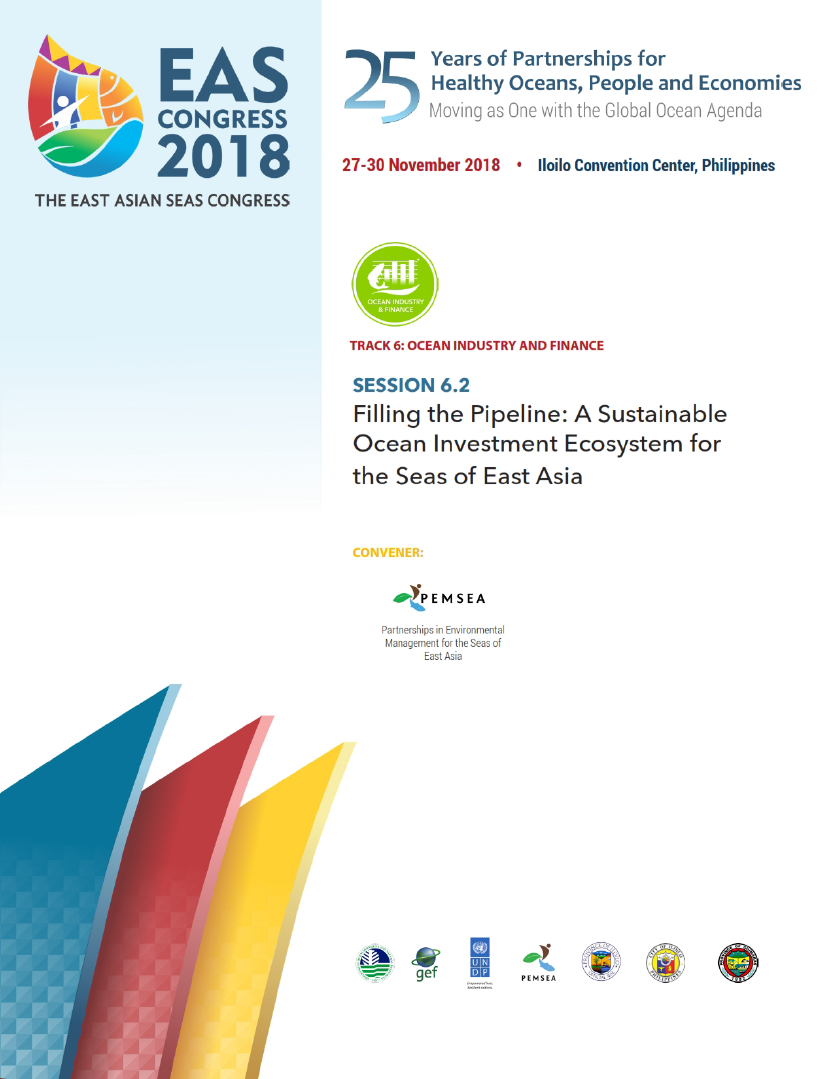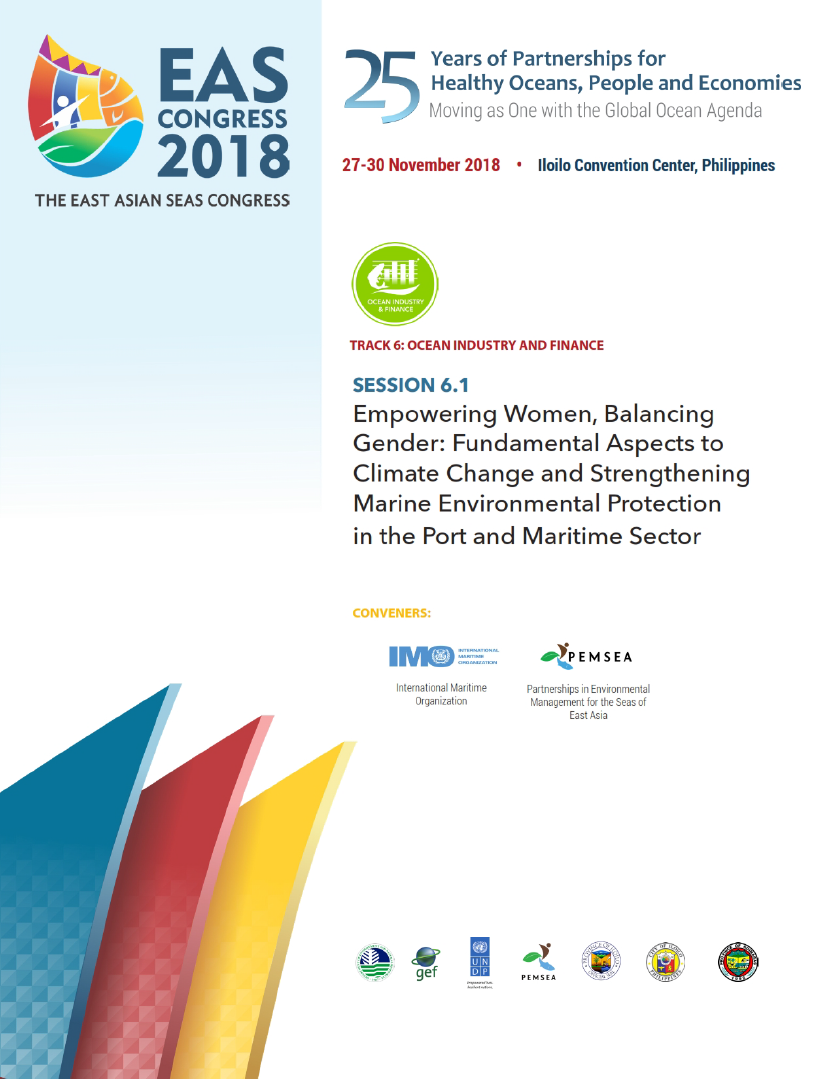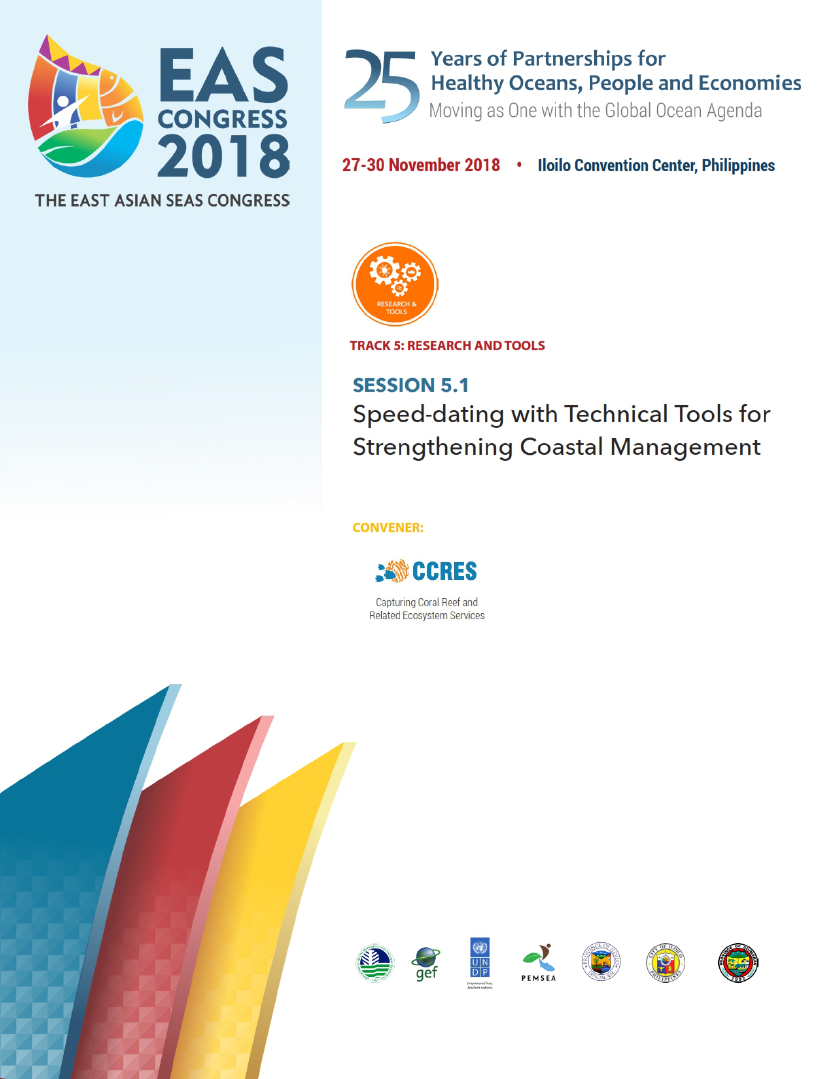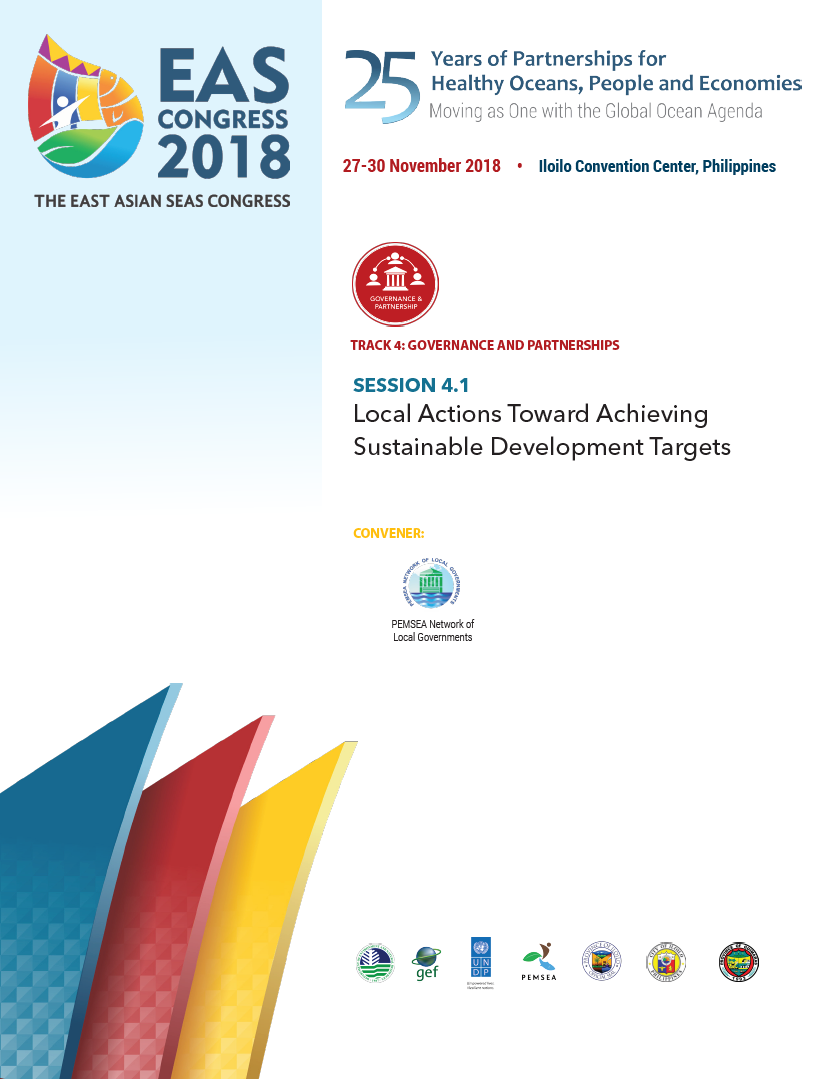
Breadcrumb
Proceedings of the PNLG Forum 2018 (EASC2018)
The 2018 PEMSEA Network of Local Governments for Sustainable Coastal Development (PNLG) Forum was held at Andana Resort, Guimaras Province, Philippines on 29 November 2018. The Provincial Government of Guimaras hosted the forum.
The Forum was attended by representatives from PNLG members from Cambodia (Kampot, Kep, Koh Kong, and Preah Sihanouk); Indonesia (Bali, Bontang, Sukabumi and Tangerang); Malaysia (Northern Selangor, Port Klang, and Sepang); PR China (Fangchenggang, Jinjiang, Pingtan, Sanya and Xiamen); Philippines (Bataan, Batangas, Cavite, and Guimaras); RO Korea (Ansan, Shihwa and Changwon); Thailand (Chonburi); Timor-Leste (Dili, Liquiçá, and Manatuto); and Vietnam (Danang and Quang Nam).
Representatives from various local governments and institutions participated as observers, including Lao PDR (Champasak, Saravanne and Sekong); Philippines (Oriental Mindoro and Romblon); and Thailand (Trat, Chanthaburi and Rayong).
Proceedings of the 6th Ministerial Forum (EASC2018)
The Sixth Ministerial Forum was held at Courtyard by Marriott, Iloilo City, Philippines on 29 November 2018. Carrying the theme, “25 Years of Partnerships for Healthy Oceans, People and Economies: Moving as One with the Global Ocean Agenda”, the Sixth Ministerial Forum was hosted by the Department of Environment and Natural Resources (DENR) of the Philippines. Present in the forum were 11 Ministers and heads of delegations from the East Asian Countries, and about 50 observers from among the PEMSEA Non-Country Partners, together with members of PEMSEA’s East Asian Seas Partnership Council Executive Committee, representatives from PEMSEA’s sponsoring agencies, the GEF and UNDP, and some PEMSEA collaborators.
The highlights of the Sixth Ministerial Forum, included:
The presentation of the key results of the Regional and National State of Oceans and Coasts (SOC) reports on Blue Economy;
Delivery of individual country statements highlighting countries’ outlook, plans and initiatives related to the implementation of the SDS-SEA in line with the UN Sustainable Development Goals; and
The signing of the Iloilo Ministerial Declaration on East Asian Region Moving as One for Healthy Oceans, People and Economies.
The Regional and National SOC Reports are key outputs of the PEMSEA member countries that looked into the countries’ ocean economy, ocean industries, valuation of coastal and marine ecosystem services, risks and pressures on oceans in the region, and examples of blue economy initiatives. The reports aim to provide the baseline for future assessments. Initial estimates show that the SOC provides a comprehensive approach to evaluate the contribution of oceans and coasts, impacts of human activity on the ocean, as well as monitor progress towards the SDGs, SDS-SEA, and other international agreements through the blue economy and ocean governance initiatives. Based on the reports, the oceans serve as an important source of income and jobs for countries in the EAS region, with significant share in countries’ GDP. While ocean’s ecosystem services are still not much valued in most countries, available information showed ocean as a natural capital represents 50-55% of ocean economy across the region. It is hoped that the SOC can be utilized as an important tool to advance scientific support, raise public awareness, promote good governance and partnerships for blue economy, and foster the development of synergies among the various sectors and stakeholders.The Forum culminated with the signing of the Iloilo Ministerial Declaration on East Asian Region Moving as One for Healthy Oceans, People and Economies. The Declaration reaffirmed the countries’ ommitment to the SDS-SEA, and in particular to achieving the remaining targets from the Da Nang Compact, regular updating of SOC reports, reducing or preventing marine pollution of all kinds, promotion of sustainable coastal tourism programs, support development of blue economy investment projects, and support operations of PRF as coordinating mechanism for SDS-SEA implementation through voluntary contributions beyond 2019.
2018 East Asian Youth Declaration on Sustainable Seas and Climate Action
This declaration was written and agreed upon by the delegates of the Fifth EAS Youth Forum, held in Iloilo City, Philippines, from 26-30 November 2018.
It was presented by the PEMSEA Network of Young Leaders (PNYL) Captain John Carl Alonsagay during the closing ceremony of the EAS Congress 2018.
TRANSLATIONS DOCUMENT TITLE
中文 2018 东亚青年“海洋与气候可持续行动”宣言
Summary Report of the Sixth Senior Government Officials' Meeting (EASC2018)
The Sixth Senior Government Officials’ Meeting (SGOM) was held at the VIP Room, Iloilo Convention Center, Iloilo City, Philippines on 28 November 2018. Senior Government Officials from 11 PEMSEA Country Partners participated in the meeting, namely: Cambodia, PR China, DPR Korea, Indonesia, Japan, Lao PDR, Philippines, RO Korea, Singapore, Timor-Leste and Viet Nam. The PEMSEA Resource Facility (PRF) served as the Secretariat for the Meeting. The Meeting agreed to adopt the Iloilo Ministerial Declaration as revised by the Meeting, for submission to the Sixth Ministerial Forum for final signature.
Fifth EAS Youth Forum Toolkit
Toolkit used by delegates at the Fifth EAS Youth Forum, which took place at the EAS Congress 2018.
Proceedings of the workshop on Filling the Pipeline: A Sustainable Ocean Investment Ecosystem for the Seas of East Asia (EASC2018 Session 6 Workshop 2)
The need for significantly increased investment to achieve the targets under the UN Sustainable Development Goals (SDGs) is well understood. UNDP cites a USD2.5 trillion gap in investments required to meet the SDGs, and it’s not likely that all of this financing will come from government and donor support. By catalyzing private sector investment, there is an opportunity to redirect billions of dollars of capital away from unsustainable investment towards sustainable, blue economy investments in the region.
To address this need and opportunity, a number of new funds have emerged to focus on investing in sustainable development of oceans, in areas including fisheries, marine pollution and coastal tourism. However, funds face challenges in sourcing investment projects that can support the SDGs while offering viable investment models. Local governments look to engage in the investment conversation, but may not know where to start. At the same time, donor support has a role to play in developing new models and approaches that can lower risks and catalyze the flow of private capital to investments that can have an impact at the local level.
This session was designed to introduce the emerging investment ecosystem for the Seas of East Asia, including lessons learned for sourcing and developing investments that address critical ocean challenges, such as ocean plastics, wastewater, sustainable aquaculture, marine conservation, and more. Building on the regional Strategic Action Programme (SAP) coordinated by PEMSEA, which brings together donors, technical partners and the private sector, this new investment ecosystem can catalyze both public and private financing, building a pipeline of investment opportunities supporting SDG 14 and unlocking the ocean investment potential in region.
Proceedings of the workshop on Empowering Women, Balancing Gender: Fundamental Aspects of Adapting to Climate Change and Strengthening Marine Environmental Protection in the Port and Maritime Sector (EASC2018 Session 6 Workshop 1)
This partnership hub aimed to identify and review existing programmes and initiatives on strengthening the integration of women and gender equality in the port and maritime sector. International organizations in this sector (e.g. IMO, ILO) are encouraging countries to enable women to train alongside men to acquire the high-level of competence that the port and maritime industry demands to better cope with the demands of the jobs, including the effects of climate change.
How are the national maritime agencies and training institutes proceeding? The partnership hub aimed to review the progress among East Asian countries, particularly in the context of two key challenges to sustainable port management and operations, namely: climate risk assessment, mitigation and adaptation; and marine environmental protection in the port sector. The application of the Port Safety, Health and Environmental Management System (PSHEMS) as a framework for facilitating the planning, development implementation of women and gender safeguards in the port industry will also be explored.
The partnership hub also aimed to consider how national agencies and training institutes in the maritime and port sector can be encouraged and assisted to adopt and implement programs on empowering women and gender equality, and to strengthen these aspects in future trainings on PSHEMS and management interventions focused on climate change and marine environmental protection.
Proceedings of the workshop on Speed-dating with Technical Tools for Strengthening Coastal Management (EASC2018 Session 5 Workshop 1)
In developing countries, coastal ecosystems — coral reefs, mangroves and seagrass beds — provide fish to eat and trade, support tourism, protect coastlines from storms and filter water. Coastal communities rely on these coastal ecosystems for their livelihoods, food and wellbeing. Unfortunately, these ecosystems are under threat from pollution, overfishing, destructive fishing, unsustainable coastal development and climate change.
The Capturing Coral Reef & Related Ecosystem Services (CCRES) project (2014-2018) has been assisting governments and communities to sustain these coastal ecosystems. In collaboration with project partners and beneficiaries, the CCRES project has developed a suite of technical models, tools and knowledge products to assist managers, policymakers and planners to strengthen the governance of coastal ecosystems.
The tools are used for planning Marine Protected Areas (MPAs), modelling socioecological systems, developing sustainable enterprises and fostering behaviour change. They have been developed following research by multi-disciplinary teams that include scientists, policy-makers, businesses and other experts from a range of fields — collaboration between centres of discovery, learning and engagement in North America, Australia and importantly our partners in Indonesia and the Philippines.
In this session attendees joined fun, interactive “speed-dating” groups, facilitated by experienced CCRES team members. The session “matched” tools with 24 participants and explored how together they can strengthen integrated coastal management, planning and governance across the East Asian Seas region.
Proceedings of the workshop on Local Actions Toward Achieving Sustainable Development Targets (EASC2018 Session 4 Workshop 1)
The PEMSEA Network of Local Governments (PNLG) adopted the Ansan Declaration on 6 September 2016 in Ansan, Republic of Korea, which renewed the commitment of the members to implement the PNLG Strategic Action Plan (2016-2021) through their respective integrated coastal management (ICM) programs and related initiatives. The local governments committed, in particular, to identifying time-bound SDG targets and plans for sustainable development of coastal areas and blue economy growth; report annually on the progress towards achieving the targets and share information through various knowledge platforms.
This session provided the opportunity for the PNLG members and other local governments and partners to discuss the experiences and good practices in implementing plans and programs related to SDG 6 (water and sanitation), SDG 11 (sustainable cities), SDG 13 (climate action), SDG 14 (Life below water and SDG 17 (partnerships for the goals). The session also discussed the mechanisms for implementation, monitoring and reporting and partnership development in facilitating the achievement of the SDG targets at the local level.
